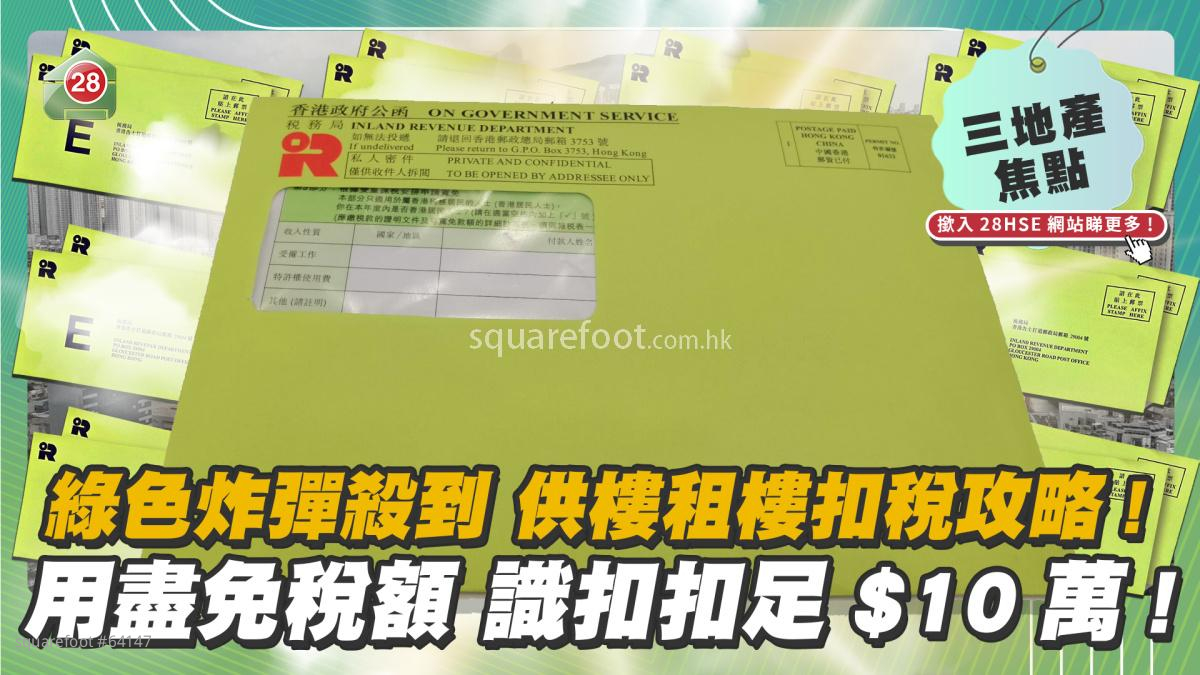- Home
- News
- Expert Blog
- Wed Property Focus
- Tax Season Arrives: Key Points For Deductions On Mortgage And Rental Payments
As May arrives, many employees are receiving their "green envelopes" (tax forms sent by the Inland Revenue Department (IRD)) and must file their completed tax returns by June 3rd. If opting for online submission, the deadline is extended by an additional month.
Amid Hong Kong's considerable fiscal deficit, Financial Secretary Paul Chan Mo-po noted in the latest Budget that while salary and personal income taxes still benefit from a 100% reduction, the cap has been reduced from HK$6,000 to HK$3,000. Consequently, workers will incur higher taxes this year, making it essential to maximise use of tax exemptions. What key points should you consider?
Whether purchasing or renting property, taxpayers have opportunities to benefit from housing-related tax deductions. Under the current tax system, homeowners can deduct home loan interest expenses to reduce financial burdens, but this only applies to properties they reside in. The maximum annual deduction is HK$100,000, applicable for up to 20 tax years, without the need for these years to be consecutive.
It's crucial to understand that tax deductions are only applicable to owner-occupied units. Consequently, units purchased off-plan are ineligible for these exemptions until they are completed and become existing properties. Furthermore, schemes such as "buy now, pay later" offered by developers do not qualify for deductions, because the property developer remains the registered owner, rather than the taxpayer.
For tenants, Tax Deduction for Domestic Rent benefit is available indefinitely, allowing a maximum annual deduction of HK$100,000. This means if your monthly rent is HK$8,333, you can fully utilize the deductible amount.
Two scenarios can influence the calculation of the deductible amount: In shared tenancies, deductions are divided based on the number of tenants. Additionally, if the rental period paid only covers part of the tax year, then deductions are calculated proportionally to the actual rental period.
To qualify for Tax Deduction for Domestic Rent, it is essential that the lease is officially stamped. If a lease is not stamped, this can be corrected by having it stamped within 30 days of signing to avoid penalties and to ensure eligibility for deductions.
However, some landlords may refuse to stamp leases or even to sign them, thereby preventing tenants from claiming deductions. The primary reason for this behavior is that declaring rental income subjects the landlord to property tax. By not stamping the lease or avoiding a formal lease agreement altogether, landlords can evade these taxes and save money.
Another reason landlords might avoid stamping leases is due to illegal rentals, such as offering subsidised housing that is not allowed to be rented or properties with high mortgage leverage. These circumstances compel landlords to evade formal lease agreements to avoid legal repercussions. Typically, the advantage for tenants in these situations is lower rent.
Lastly, it's important to note that landlords are not eligible for Tax Deduction for Domestic Rent. Therefore, even if you are involved in "double renting," you cannot claim dual benefits. It is crucial to be accurate and cautious when filing your taxes to avoid errors.
Like
| Property Type | Price | Ads Period |
|---|---|---|
| For Sale Property | ||
Normal Listing Typical One | HKD:1000 (or Hsemoney:1000) | Valid:90 days |
Golden Top Listing Higher position than Top listing 2-3times better performance | HKD:3000 (or Hsemoney:3000) | Valid:60 days |
| Rental Property | ||
Normal Listing Typical One | HKD:1000 (or Hsemoney:1000) | Valid:80 days |
Golden Top Listing Higher position than Top listing 2-3times better performance | HKD:3000 (or Hsemoney:3000) | Valid:60 days |
